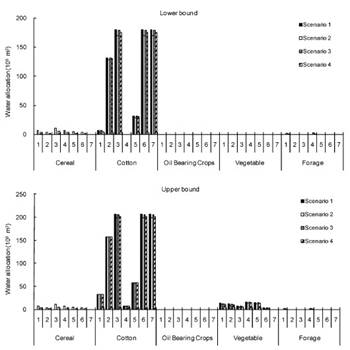Optimization of the Irrigation Water Resources for Agricultural Sustainability in Tarim River Basin
2012-06-18
Water resources are lifeline of oasis agriculture development in arid region. The availability of water is an important factor for agricultural production in arid areas. However, excessive utilization of water resources strongly influences local agricultural development and accelerates environmental degradation. Therefore, it is important for the government and farmers to strengthen water infrastructure construction for improving water use efficiency.
Although there are some programs can deal with situations when some random parameters or variables appear in the modeling formulation of a program or can reflect nonlinearity in the cost/benefit objectives under a number of system conditions, these programs all have their limitations in practice.
Based on the previous works, researchers developed a two-stage interval quadratic programming (TIQP) method for planning agriculture water management in Tarim River Basin, Northwest China. The developed method couples two-stage stochastic programming (TSP) with inexact quadratic program (IQP). The hydrological model is provided for forecasting the available irrigation water. The simulation system is then embedded into an optimization framework, where the objective is to maximize the system benefit for water resources management. The developed method can not only deal with nonlinearities in the cost/benefit objective and uncertainties expressed as probabilities and intervals, but also support the analysis of policy scenarios that are associated with economic penalties when the promised water-allocation targets are violated. A case study is conducted in Tarim River Basin. The results obtained can help generate desired policies for water resources management with maximized economic benefit and minimized system-failure risk.
The result has been published on Agricultural Water Management, 2012, 107: 74-85. The paper is also archived at http://www.sciencedirect.com/science/article/pii/S0378377412000285.

Optimized water allocation patterns under low-medium inflow. (Image by XIEG)



